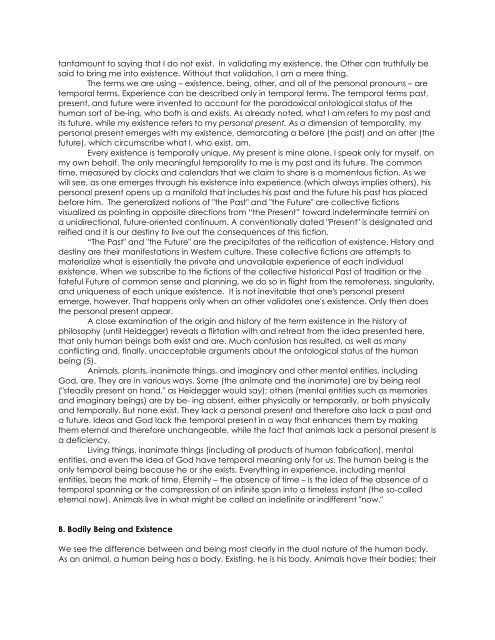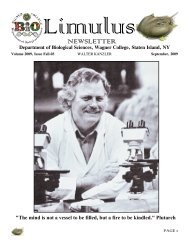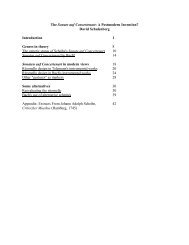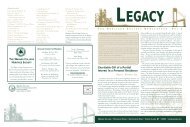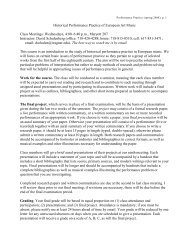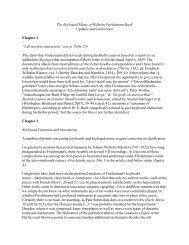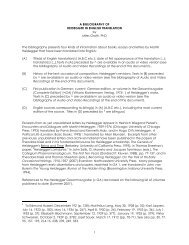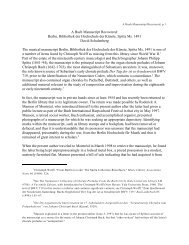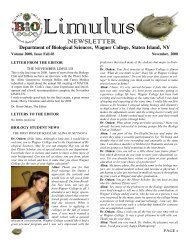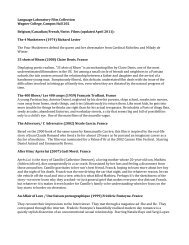SEVEN PAPERS ON EXISTENTIAL ANALYSIS ... - Wagner College
SEVEN PAPERS ON EXISTENTIAL ANALYSIS ... - Wagner College
SEVEN PAPERS ON EXISTENTIAL ANALYSIS ... - Wagner College
You also want an ePaper? Increase the reach of your titles
YUMPU automatically turns print PDFs into web optimized ePapers that Google loves.
tantamount to saying that I do not exist. In validating my existence, the Other can truthfully be<br />
said to bring me into existence. Without that validation, I am a mere thing.<br />
The terms we are using – existence, being, other, and all of the personal pronouns – are<br />
temporal terms. Experience can be described only in temporal terms. The temporal terms past,<br />
present, and future were invented to account for the paradoxical ontological status of the<br />
human sort of be-ing, who both is and exists. As already noted, what I am refers to my past and<br />
its future, while my existence refers to my personal present. As a dimension of temporality, my<br />
personal present emerges with my existence, demarcating a before (the past) and an after (the<br />
future), which circumscribe what I, who exist, am.<br />
Every existence is temporally unique. My present is mine alone. I speak only for myself, on<br />
my own behalf. The only meaningful temporality to me is my past and its future. The common<br />
time, measured by clocks and calendars that we claim to share is a momentous fiction. As we<br />
will see, as one emerges through his existence into experience (which always implies others), his<br />
personal present opens up a manifold that includes his past and the future his past has placed<br />
before him. The generalized notions of "the Past" and "the Future" are collective fictions<br />
visualized as pointing in opposite directions from “the Present” toward indeterminate termini on<br />
a unidirectional, future-oriented continuum. A conventionally dated "Present" is designated and<br />
reified and it is our destiny to live out the consequences of this fiction.<br />
“The Past" and "the Future" are the precipitates of the reification of existence. History and<br />
destiny are their manifestations in Western culture. These collective fictions are attempts to<br />
materialize what is essentially the private and unavailable experience of each individual<br />
existence. When we subscribe to the fictions of the collective historical Past of tradition or the<br />
fateful Future of common sense and planning, we do so in flight from the remoteness, singularity,<br />
and uniqueness of each unique existence. It is not inevitable that one's personal present<br />
emerge, however. That happens only when an other validates one's existence. Only then does<br />
the personal present appear.<br />
A close examination of the origin and history of the term existence in the history of<br />
philosophy (until Heidegger) reveals a flirtation with and retreat from the idea presented here,<br />
that only human beings both exist and are. Much confusion has resulted, as well as many<br />
conflicting and, finally, unacceptable arguments about the ontological status of the human<br />
being (5).<br />
Animals, plants, inanimate things, and imaginary and other mental entities, including<br />
God, are. They are in various ways. Some (the animate and the inanimate) are by being real<br />
("steadily present on hand," as Heidegger would say); others (mental entities such as memories<br />
and imaginary beings) are by be- ing absent, either physically or temporarily, or both physically<br />
and temporally. But none exist. They lack a personal present and therefore also lack a past and<br />
a future. Ideas and God lack the temporal present in a way that enhances them by making<br />
them eternal and therefore unchangeable, while the fact that animals lack a personal present is<br />
a deficiency.<br />
Living things, inanimate things (including all products of human fabrication), mental<br />
entities, and even the idea of God have temporal meaning only for us. The human being is the<br />
only temporal being because he or she exists. Everything in experience, including mental<br />
entities, bears the mark of time. Eternity – the absence of time – is the idea of the absence of a<br />
temporal spanning or the compression of an infinite span into a timeless instant (the so-called<br />
eternal now). Animals live in what might be called an indefinite or indifferent "now."<br />
B. Bodily Being and Existence<br />
We see the difference between and being most clearly in the dual nature of the human body.<br />
As an animal, a human being has a body. Existing, he is his body. Animals have their bodies; their


